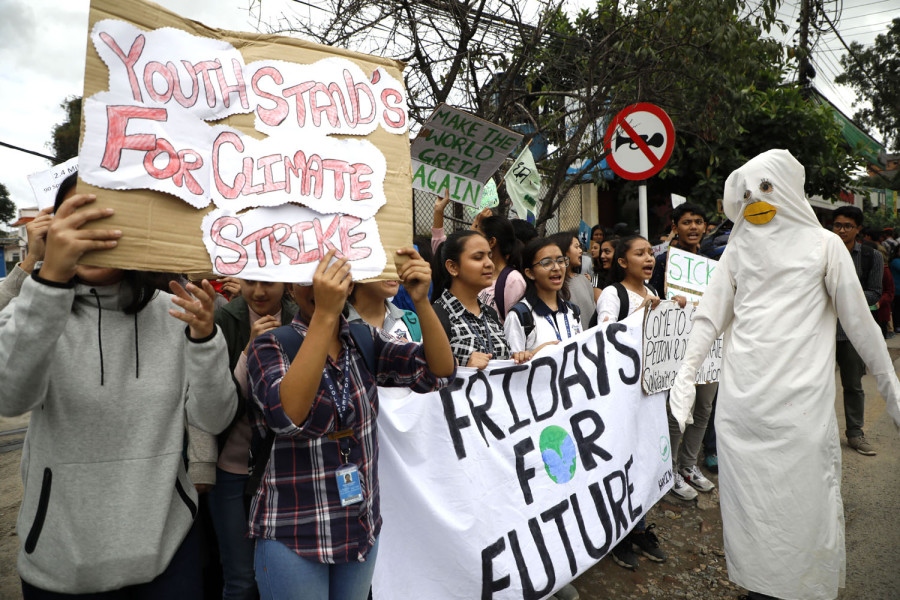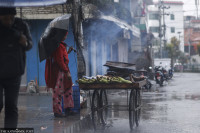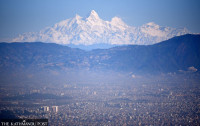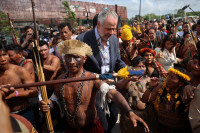Climate & Environment
Nepalis joined the global climate strike, but many remain ill-informed about the climate crisis
Environmentalists say the government should be proactive in talking about the effects of climate change and how vulnerable Nepal is as a country.
Chandan Kumar Mandal
This week, millions of people took to the streets across the world as a part of the Global Climate Strike, demanding action to combat climate change and its adverse impacts. People in Nepal, primarily in Kathmandu Valley, were also out on the streets, expressing solidarity with the movement spearheaded by Swedish activist Greta Thunberg and supported by millions of people from as many 150 countries.
On Friday, the last day of climate strike week, at least four such events were organised in Kathmandu by youths, who rallied with placards, banners and slogans about saving the planet, the impacts of global warming and asking the government to act.
However, most protestors the Post spoke with were either unaware of what the government is doing or not clear on what the Nepal government should be doing in its fight against climate change.
“All I know that the government is doing nothing,” Sanju Bhandari, an eleventh grader, told the Post. “They are not concerned enough so they have not done anything.”
Pragati Sapkota, another eleventh grader, said that she had heard that the government would be replacing old vehicles to control air pollution.
Each of the four protests in the Capital had about a few dozen participants, who were mostly students taking part in Thunberg’s call for a ‘school strike for the climate’, also known as Fridays for Future. The small number of participants was emblematic of how much the public knows about climate change and its impacts in Nepal, experts said.
According to Madhukar Upadhya, a watershed management and climate change expert, despite the country’s vulnerability to climate change, the protests did not gather much steam.
“In Afghanistan, the protest march was escorted by armed police, but in Nepal, not a big crowd was out to demand action. There were only a few students and youth activists,” said Upadhya. “People are not aware of the gravity of climate change and its impact on their day-to-day life.”
Nepal is ranked as one of the most vulnerable countries to the effects of climate change. The impacts of climate change are already being felt in Nepal, where extreme weather events and glacier melt have increased in recent times.
According to Raju Pandit Chhetri, a climate change activist who has been involved in international climate negotiations, the small turnout in climate strike events shows that people are not well informed about how vulnerable we are as a country.
“And that’s largely on our government,” he said, “because they have failed to communicate the difference between the existing effects of climate change versus impending disaster if we don’t address the issue with urgency.”
For Upadhya, actions to combat climate change have remained limited to government officials attending international conferences and talking about excessive melting of snow in the Himalayas when the real impacts are being felt on a smaller scale, affecting normal lives.
“As a country that is already being impacted by climate change, Nepal has dual responsibilities—support global movements like Greta’s demand for lowering carbon emissions, planting more trees and promoting green vehicles,” said Upadhya. “On the other hand, we also have to do work to adapt and mitigate the effects of climate change that are visible in the weather, agriculture, food security, and natural disasters.”
While the global movement has been demanding ambitious climate actions like limiting carbon emissions, putting an end to fossil fuel consumption, and treating climate change as a ‘climate crisis’, most participants in Nepal’s climate strike suggested that the government should be managing garbage, controlling pollution and promoting recycling.
However, many believe that the purpose of the strike is not just to demand concrete action but also to raise awareness. Ankita Bhetwal, who travelled from Balaju to take part in a protest organised by Amnesty International at New Baneshwor, said she joined the protest because this was an opportunity to draw the attention of the government.
“I came here because I care about the climate. Our government should care too, but they don’t care enough,” said Bhetwal. “As an individual, we can stop the use of plastic straws, but how about stopping the manufacturing of plastic that is happening across the country?”
According to her, the government should be held accountable by questioning what they have done so far to fight the climate crisis.
“Not many people know what the government has been doing, what it has done, or wants to do to address climate change,” said Bhetwal. “Coming on the streets and holding a placard can only mean something if the government is actually accountable. The government sharing information about its efforts and progress will encourage people to do something as well.”
The government has recently drafted a climate change policy which aims to make the country more resilient to climate change. It is also working on drafting a National Adaptation Plan, an international initiative for countries vulnerable to climate change. Some non-governmental agencies are working in various districts to help people adapt to climate change, supporting them on alternative livelihood and farming techniques.
But Upadhya says the government needs to be more proactive, and inform the public about the impact of climate change and the country’s future.
“Here, climate change is being treated as an issue imported from the West,” said Upadhya. “It’s as if we are doing something to save the planet in exchange for some funds.”




 22.6°C Kathmandu
22.6°C Kathmandu










